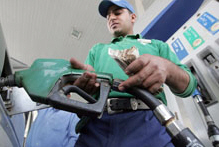
Typical street scene in Santa Ana, El Salvador. (Photo: iStock)
IMF Survey: IMF To Investigate Factors Behind Oil Price Surge
June 14, 2008
- G8 calls on IMF, IEA to probe real and financial factors behind price hikes
- Strauss-Kahn says IMF will look into possible role of speculators
- Says slowdown in world economy not deep, but likely protracted
The International Monetary Fund will prepare an analysis of the real and financial factors behind the recent surge in oil and commodity prices, their volatility, and the effects on the global economy, Managing Director Dominique Strauss-Kahn said.

The G8 urged oil-producing nations to step up output to curb the feverish rise in crude prices. (photo: Khaled Desouki/AFP)
High commodity prices
Responding to a call by the Group of Eight (G8) major industrial nations, Strauss-Kahn said that as part of the analysis, the IMF would look into the possible role of financial market speculation in the recent price hikes.
"How important it is and what kind of influence it has on the market and futures is something we have to investigate," he told reporters in Osaka, Japan after the June 13-14 meeting.
Strauss-Kahn said it was not clear if speculators were a factor, but that some G8 ministers wanted this looked into. Separately he said that he expected the slowdown in the world economy to rein in oil prices that have touched record highs.
Dampening global growth
The impact of high energy and food costs on global growth was the main theme of talks, which Strauss-Kahn also attended, between finance ministers of Canada, France, Germany, Italy, Japan, Russia, the United Kingdom, and the United States in Osaka.
The June meeting was in preparation for a July G8 summit that will also be held in Japan. The meeting was clouded by continued fallout from the U.S. subprime crisis, the impact of high commodity and fuel prices on an already slowing world economy, and the renewed risk of rising inflation in several countries.
Strauss-Kahn said that despite the better than expected first quarter performance of some industrialized countries, particularly the United States, he still expected a prolonged slowdown in the global economy. "Even if the slowdown is not going to be deep, it is going to be protracted," the managing director said. [See related story: Strauss-Kahn Stresses Multilateral Approach."]
Report for Annual Meetings
The G8 communiqué called on the IMF and the International Energy Agency "to work together, with appropriate national authorities, in carrying out further analysis of real and financial factors behind the recent surge in oil and commodity prices, their volatility, and the effects on the global economy, and report back at the next Annual Meetings."
The IMF and the World Bank hold their annual meetings in Washington this October.
The G8 also urged oil-producing nations to step up output to curb the feverish rise in crude prices, which has stoked protests worldwide over rising fuel costs.
Strauss-Kahn said the IMF now had a role to play in helping to better understand the interlocking workings of the global economy following the boom in commodities, adding the past consensus on the issue had become "outdated."
"A lot of analysis has to be done to rebuild an understanding of the economic environment in which we are," he said.
Other issues in the G8 communiqué relating to the IMF were:
• Strengthening the financial system. The G8 looked forward to concrete progress by the IMF and the Financial Stability Forum on reinforcing early warning capabilities in financial sector work.
• Promoting oil market transparency. Ministers called for greater transparency and reliability in market data, including on oil stocks, and urged wider and more timely participation in the Joint Oil Data Initiative, in which the IMF is participating.
• Sovereign wealth funds. The G8 encouraged investors to work with the IMF to identify and adopt high standards in areas such as governance, risk management, and transparency.
• Addressing high food prices. The G8 welcomed work by the IMF to address the needs of food importing countries facing balance of payments difficulties, including through a review of its Exogenous Shocks Facility.
• Examining fuel subsidies. The G8 asked the IMF to conduct work on reform of fosil fuel subsidies, with a report by the Annual Meetings.
Comments on this article should be sent to imfsurvey@imf.org


